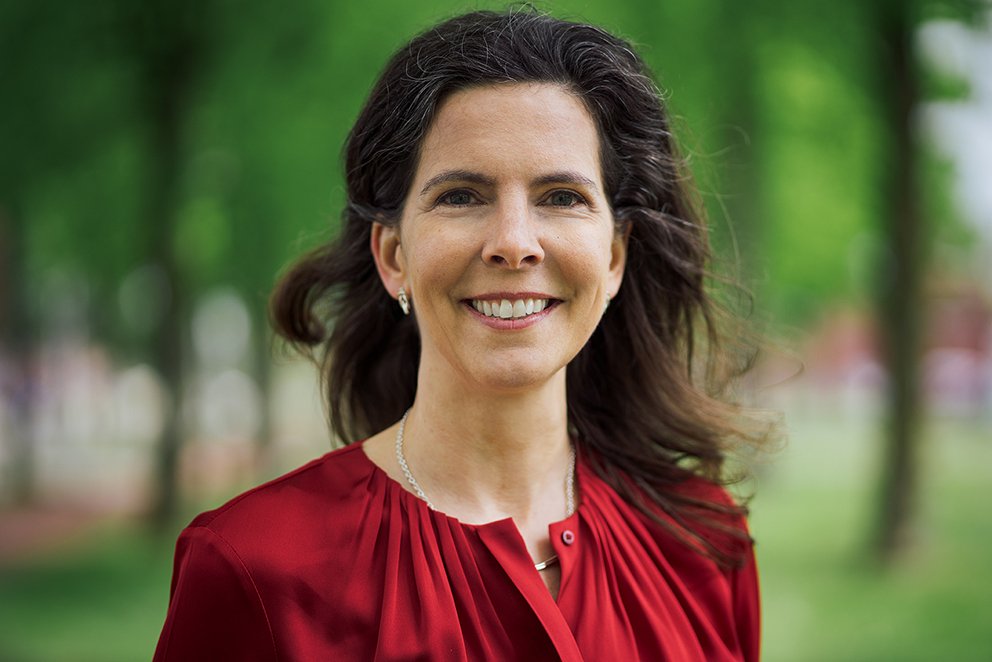New Dean Debbie Jaarsma
I didn't necessarily have any ambitions to become an administrator as such. I just wanted to be one here

‘I grew up in The Hague, but we lived in Twente for a while from the time I was eleven till I was fifteen. That turned out to be a really formative period in my life. It was beautiful there and I really missed the area when we were back in the busy Randstad. I dreamt of becoming a veterinarian and going back to the countryside. I loved the idea of being outdoors and wearing my wellies. The prospect of sitting in an office all day seemed awful.’
But life is full of unexpected twists and turns. On 2 August, Debbie Jaarsma – currently Professor of Research and Innovation in Medical Education at UMC Groningen – will become Dean of the Faculty of Veterinary Medicine. Although she didn't always aspire to be an administrator, we're grateful she had the courage to change course. ‘I've never been afraid to take the road less travelled. In fact, I love getting lost every time I go to the woods.’
Debbie Jaarsma studied Veterinary Medicine in Ghent and later in Utrecht, after first being eliminated three times in a draw. However, she found she didn't enjoy the practical side of the job that much during her residency, and wasn't very good at it either. ‘The cows would never stand still when I was examining them.’
She had the opportunity to specialise as a pathologist after graduating, but preferred being among students to peering through a microscope. She decided to drop out and became an animal health lecturer at HAS University of Applied Sciences in Den Bosch. 'My parents were disappointed that I didn't become a specialist or a practising veterinarian. But I'm not motivated by status, I just do what feels right and what I enjoy.’
The cows would never stand still when I was examining them
Educational reform
After a stint in the pharmaceutical industry, Jaarsma returned to Utrecht and obtained a doctorate for her research on curricular changes in veterinary education. From 2011 onwards, she held professorial positions in Amsterdam and Groningen, where she founded the LEARN research group consisting of 45 PhD students and 9 professors. LEARN stands for Lifelong Learning Education and Assessment Research Network. The group's mission: laying the groundwork for educational and curricular innovations. Jaarsma: ‘The past few years have really taught me that the quality of your education ultimately hinges on your lecturers. Training them well is half the battle, and I think Utrecht University is doing really well in that area. The faculty has also been consistently innovative in terms of education. The people here might not necessarily always realise that: there's no other veterinary faculty in the Netherlands to compare things with.’
Coming home
After ten years as a professor, it was time for a fresh challenge. Several people in Jaarsma's circle envisaged a board position in her future. ‘I didn't necessarily have any ambitions to become an administrator as such. I just wanted to be one here at the faculty. When I parked my car on Yale Avenue for this interview today, it really felt like coming home. This place is part of my identity, it's where I became who I am today. I hold the faculty dear and I want it to remain a shining presence in the academic world and broader society. It's also a real pleasure to see animals again during my working day.’ ‘The strategic plans for the faculty and Utrecht University as a whole really appeal to me. There's a lot of emphasis on recognition and reward and encouraging an open attitude, which is right up my alley. I was also a member of the Recognition and Reward core committee in Groningen. Academics like to work on the cutting edge of new knowledge, but that's certainly not a given. You need to keep feeling that energy, it all starts from there.’
Network veterinary medicine
Jaarsma also feels it is important for students to develop a broad perspective on the professional field. They obviously need to learn about high-complexity care, but it doesn't stop there. Preventive, primary, secondary and tertiary care should all complement each other. Naturally, patient care, education and research – and all the other fields veterinarians end up working in – are also closely interlinked. ‘Those aren't just separate pillars; they're actually communicating vessels. I think we can learn to collaborate even more effectively across the entire playing field. In human care, that philosophy is referred to as network medicine. I'm a strong supporter of the idea of network veterinary medicine.’
‘We already have all the right people here’
Those close to her describe Jaarsma as a positive-minded unifier. ‘Effective collaborations happen when you bring the right people together. We already have all the right people here, I'm sure of that. The faculty has become more visible to the outside world in recent years. That connection with society is important to me. I want to have an open outlook on the world and provide answers to societal challenges. The Board has been working hard to build a new organisation over the past few years. Now we'll have to make sure those changes really take root and keep everyone here happy. If you can do that, you'll have the right preconditions for that open-minded outlook on the wider world I was talking about. That will ultimately lend the faculty the new energy and momentum it needs.’

